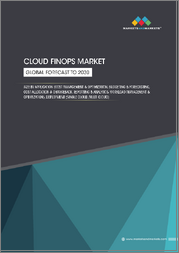
|
시장보고서
상품코드
1801142
클라우드 전문 서비스 시장 규모, 점유율, 동향, 예측 : 서비스별, 조직 규모별, 전개 모델별, 최종 이용 산업별, 지역별(2025-2033년)Cloud Professional Services Market Size, Share, Trends and Forecast by Service, Organization Size, Deployment Model, End Use, and Region, 2025-2033 |
||||||
세계 클라우드 전문 서비스 시장 규모는 2024년 291억 달러에 달했습니다. 향후 IMARC Group은 이 시장이 2033년까지 1,009억 달러에 달할 것으로 예상하며, 2025-2033년까지 14.8%의 CAGR을 기록할 것으로 전망하고 있습니다. 현재 북미가 시장을 독점하고 있으며, 2024년에는 48.8% 이상의 큰 시장 점유율을 차지했습니다. 비즈니스 프로세스의 디지털화에 대한 관심 증가, AI, ML, 개발 및 운영(DevOps) 관행의 발전, 적응형 정보기술(IT) 생태계 구축에 대한 중요성 증가는 전 세계 시장 성장에 긍정적으로 기여하는 주요 요인 중 일부입니다.
세계 클라우드 전문 서비스 시장 규모는 2024년 291억 달러로 평가되었습니다. 향후 IMARC Group은 2033년에는 1,009억 달러에 달할 것으로 예상하며, 2025-2033년 CAGR은 14.8%에 달할 것으로 예측합니다. 현재 북미가 시장을 독점하고 있으며, 2024년에는 48.8% 이상의 큰 시장 점유율을 차지했습니다. 비즈니스 프로세스의 디지털화에 대한 관심 증가, AI, ML, 개발 및 운영(DevOps) 관행의 발전, 적응형 정보기술(IT) 생태계 구축에 대한 중요성 증가는 전 세계 시장 성장에 긍정적으로 기여하는 주요 요인 중 일부입니다.
미국 클라우드 프로페셔널 시장은 기업들이 경쟁력과 민첩성을 높이기 위해 디지털 전환을 추구하는 요즘, 클라우드 기술 채택이 확대되고 있는 것을 주요 요인으로 크게 확대되고 있습니다. 기업이 성능과 비용 효율성을 최적화할 수 있는 하이브리드 클라우드 및 멀티 클라우드 전략으로의 점진적인 전환은 눈에 띄는 시장 트렌드 중 하나이며, 미국 전체 시장 성장에 긍정적으로 기여하고 있습니다. 예를 들어, 마이크로소프트는 2024년 11월 하이브리드 클라우드 환경을 위한 클라우드 연결 인프라 소프트웨어인 Azure local을 발표하여 기업들은 온프레미스에서 Azure 서비스를 실행할 수 있게 되었습니다. Azure local은 리소스를 원활하게 관리할 수 있으며, VMware VM을 마이그레이션할 수 있는 도구도 포함되어 있습니다. 보안 및 규제 준수에 대한 관심이 높아지면서 클라우드 전문 보안 서비스 및 전문가 지도에 대한 수요가 증가하고 있습니다. 또한, 인공지능(AI)과 자동화의 통합으로 보다 효율적이고 확장 가능한 솔루션을 가능하게 하는 서비스 제공이 변화하고 있습니다.
클라우드 전문 서비스 시장 동향
복잡한 클라우드 환경과 마이그레이션 과제
클라우드 플랫폼의 다양성과 IaaS, PaaS, SaaS, SaaS, 하이브리드 클라우드 등 서비스 모델의 다양성으로 인해 마이그레이션은 어려운 작업이 될 수 있습니다. 디지털 전환 이니셔티브의 약 70%가 클라우드 마이그레이션의 복잡성으로 인해 실패하고 있으며, 레거시 시스템을 클라우드 네이티브 환경으로 전환하는 복잡한 작업을 처리할 수 있는 전문 서비스의 필요성이 강조되고 있습니다. 이에 따라 클라우드 프로페셔널 서비스는 최신 인프라를 평가하고, 클라우드 마이그레이션에 적합한 워크로드를 분류하고, 효과적인 마이그레이션 전략을 수립하여 여러 조직을 지원하고 있습니다. 클라우드 전문 서비스는 데이터 전송, 애플리케이션 호환성, 다운타임 최소화 등 복잡한 측면을 관리합니다. 또한, 이러한 서비스는 클라우드 네이티브 기능을 활용하기 위한 리팩토링 및 재구축을 통해 레거시 애플리케이션을 현대화합니다. 이러한 서비스는 전문성을 통해 마이그레이션 리스크를 줄이고 원활한 전환을 지원하며, 기업이 클라우드의 확장성, 민첩성, 비용 절감의 이점을 누릴 수 있도록 돕습니다.
맞춤형 클라우드 전략 및 로드맵
클라우드 전문 서비스는 조직의 목표와 과제를 이해하는 데 특화되어 있습니다. 이러한 서비스는 이해관계자와 협력하여 시장 출시 시간 단축, 비용 절감, 데이터 보안 강화, 원격 근무 기능 등 명확한 목표를 설정합니다. 이와 함께 애플리케이션 마이그레이션, 클라우드 도입, 지속적인 관리, 인프라 구축을 위한 철저한 로드맵을 수립합니다. 클라우드 마이그레이션 및 맞춤형 전략을 채택한 기업의 약 45%는 일반적인 접근 방식을 채택한 기업보다 보안 침해가 적었습니다. 이는 특정 보안 요구사항, 규제 준수 요구사항, 리스크 완화 전략을 포함하는 맞춤형 클라우드 로드맵의 중요성을 강조하고 있습니다. 각 기업의 고유한 니즈에 맞게 전략을 맞춤화함으로써 클라우드는 범용 솔루션이 아닌 성장과 혁신의 촉매제 역할을 할 수 있습니다. 이러한 맞춤형 접근 방식을 통해 기업은 클라우드의 잠재력을 충분히 활용할 수 있으며, 각 산업에서 경쟁 우위를 확보할 수 있습니다.
진화하는 클라우드 기술 및 베스트 프랙티스
클라우드 컴퓨팅의 복잡성에 익숙하지 않은 기업들은 최신의 발전된 기술을 계속 따라잡는 것이 다소 어려울 수 있습니다. 클라우드 전문 서비스는 최신 트렌드에 대한 인사이트를 제공하고, 기업이 새로운 클라우드 서비스 도입 및 기존 클라우드 서비스 최적화에 대한 정보에 입각한 의사결정을 내릴 수 있도록 지원함으로써 이러한 지식의 격차를 해소하고 있습니다. 이 서비스는 최적의 클라우드 서비스 모델을 선택할 수 있도록 가이드를 제공하고, 산업 규제 준수를 보장하며, 강력한 보안 조치를 시행합니다. 또한, 데브옵스(DevOps), 컨테이너화, 서버리스 아키텍처 등 효율성과 민첩성을 높이는 최신 기술 도입도 지원합니다. 지속적인 통합 및 트렁크 기반 개발과 같은 DevOps 관행이 조직의 성과에 미치는 영향은 고품질 문서를 통해 크게 향상될 수 있습니다. 잘 정돈된 문서는 문서가 불충분한 경우와 비교했을 때, 팀의 성과를 25% 향상시킬 수 있습니다. 이러한 서비스의 전문성을 활용하면 기업은 클라우드 기술의 역동적인 환경을 자신 있게 탐색하고, 클라우드 환경을 최신 상태로 유지하며, 보안을 보장하고, 업계 모범 사례에 맞게 조정할 수 있습니다.
목차
제1장 서문
제2장 조사 범위와 조사 방법
- 조사 목적
- 이해관계자
- 데이터 소스
- 1차 정보
- 2차 정보
- 시장 추정
- 상향식 접근
- 하향식 접근
- 조사 방법
제3장 주요 요약
제4장 소개
제5장 세계의 클라우드 전문 서비스 시장
- 시장 개요
- 시장 실적
- COVID-19의 영향
- 시장 예측
제6장 시장 내역 : 서비스별
- PaaS(Platform-as-a-Service)
- SaaS(Software-as-a-Service)
- IaaS(Infrastructure-as-a-Service)
제7장 시장 내역 : 조직 규모별
- 중소기업
- 중견기업
- 대기업
제8장 시장 내역 : 전개 모델별
- 퍼블릭 클라우드
- 프라이빗 클라우드
- 하이브리드 클라우드
제9장 시장 내역 : 최종 이용 산업별
- BFSI
- 정부
- 교육
- IT와 통신
- 헬스케어
- 에너지와 유틸리티
- 제조
- 기타
제10장 시장 내역 : 지역별
- 북미
- 미국
- 캐나다
- 아시아태평양
- 중국
- 일본
- 인도
- 한국
- 호주
- 인도네시아
- 기타
- 유럽
- 독일
- 프랑스
- 영국
- 이탈리아
- 스페인
- 러시아
- 기타
- 라틴아메리카
- 브라질
- 멕시코
- 기타
- 중동 및 아프리카
제11장 SWOT 분석
제12장 밸류체인 분석
제13장 Porter's Five Forces 분석
제14장 가격 분석
제15장 경쟁 구도
- 시장 구조
- 주요 기업
- 주요 기업 개요
- Accenture PLC
- Amazon Web Services Inc.(Amazon.com Inc.)
- Atos SE
- Capgemini SE
- Cisco Systems Inc.
- Dell Technologies Inc.
- Fujitsu Limited
- HCL Technologies Limited
- Hewlett Packard Enterprise Company
- Infosys Limited
- Microsoft Corporation
- NTT DATA Corporation(Nippon Telegraph and Telephone)
- Oracle Corporation
- SAP SE
The global cloud professional services market size was valued at USD 29.1 Billion in 2024. Looking forward, IMARC Group estimates the market to reach USD 100.9 Billion by 2033, exhibiting a CAGR of 14.8% during 2025-2033. North America currently dominates the market, holding a significant market share of over 48.8% in 2024. The growing focus on digitizing business processes, the escalating importance placed on establishing adaptable information technology (IT) ecosystems along with the advancements in AI, ML and developments and operations (DevOps) practices are some of the major factors contributing positively to the market growth further across the world.
The global cloud professional services market size was valued at USD 29.1 Billion in 2024. Looking forward, IMARC Group estimates the market to reach USD 100.9 Billion by 2033, exhibiting a CAGR of 14.8% during 2025-2033. North America currently dominates the market, holding a significant market share of over 48.8% in 2024. The growing focus on digitizing business processes, the escalating importance placed on establishing adaptable information technology (IT) ecosystems along with the advancements in AI, ML and developments and operations (DevOps) practices are some of the major factors contributing positively to the market growth further across the world.
The United States cloud professional market is witnessing significant expansion mainly driven by the growing adoption of cloud technologies as businesses nowadays are pursuing digital transformation in order to enhance their competitiveness and agility. The gradual shift towards hybrid and multi cloud strategies which allows organizations to optimize their performance and cost efficiency is one of the prominent market trends, contributing positively to the market growth across the United States. For instance, in November 2024, Microsoft introduced Azure local a cloud connected infrastructure software for hybrid cloud environment allowing enterprises to run Azure services on-premises. Azure local enables seamless management of resources and includes tools for migrating VMware VMs. Rising concerns over security and regulatory compliance are fueling the demand for specialized cloud security services and expert guidance. In addition to this, the integration of artificial intelligence (AI) and automation is transforming service offerings enabling more efficient and scalable solutions.
Cloud Professional Services Market Trends:
Complex Cloud Environments and Migration Challenges
The diversity of cloud platforms and varying service models such as IaaS, PaaS, SaaS and hybrid cloud setups can make migration a difficult task. Nearly 70% of digital transformation initiatives fail due to complexities in cloud migration underlining the need for professional services to handle the intricacies of moving legacy systems to cloud-native environments. In line with this, cloud professional services support several organizations by evaluating their recent infrastructure and classifying appropriate workloads for cloud migration along with developing effective migration strategies. They manage complex aspects like data transfer, application compatibility and minimizing downtime. Moreover, these services modernize legacy applications through refactoring or rearchitecting to leverage cloud-native features. With their expertise, these services reduce migration risks ensuring a smooth transition and enabling businesses to benefit from the cloud's scalability, agility and cost savings.
Customized Cloud Strategies and Roadmaps
Cloud professional services specialize in understanding an organization's goals and challenges. These services collaborate with stakeholders to create clear objectives like faster time-to-market, cost reduction, enhanced data security or remote work capabilities. In addition to this, they establish a thorough roadmap for application migration, cloud adoption, ongoing management and infrastructure deployment. Around 45% of businesses that customized their cloud migration and strategy had fewer security breaches as compared to those that used a generic approach. This underlines the importance of tailoring cloud roadmaps to include specific security requirements, regulatory compliance needs and risk mitigation strategies. By tailoring strategies to meet the unique needs of each business these services ensure that the cloud acts as a catalyst for growth and innovation rather than a generic solution. This customized approach enables organizations to fully harness the potential of the cloud allowing them to gain a competitive advantage in their respective industries.
Evolving Cloud Technologies and Best Practices
Staying up to date with the latest advancements can be a bit challenging for businesses that are not well versed in intricacies of cloud computing. Cloud professional services bridge this knowledge gap by providing insights into latest trends and helping businesses make informed decisions about adopting new cloud services or optimizing existing ones. These services offer guidance on selecting the most suitable cloud service models thereby ensuring compliance with industry regulations and implementing robust security measures. In line with this, they assist organizations in adopting DevOps practices, containerization, serverless architectures and other cutting-edge techniques that enhance efficiency and agility. The impact of DevOps practices like continuous integration and trunk-based development on organizational performance is greatly enhanced by high-quality documentation. Well-maintained documentation is linked to a 25% boost in team performance compared to cases with poor documentation. By leveraging the expertise of these services, businesses can confidently navigate the dynamic landscape of cloud technologies, ensuring that their cloud environments remain up-to-date, secure, and aligned with industry best practices.
Cloud Professional Services Industry Segmentation:
Analysis by Service:
- Platform as a Service (Paas)
- Software as a Service (SaaS)
- Infrastructure as a Service (IaaS)
The software as a service (SaaS) segment stands as the largest service in 2024, holding around 51.3% of the market. SaaS applications are hosted and maintained by third-party providers eliminating the need for organizations to manage infrastructure and perform updates or address compatibility issues. This outsourced responsibility allows businesses to focus on utilizing the software to meet their specific needs, streamlining their operations and ultimately enhancing productivity. The subscription-based model of SaaS enables businesses to access software on a pay-as-you-go basis minimizing upfront costs and providing flexibility to scale the usage according to their requirements. This economic advantage along with the seamless user experience facilitated by cloud delivery has also contributed significantly to the widespread adoption of Software as a Service (SaaS) solutions. Furthermore, the diversity of SaaS offerings spans a wide array of applications from customer relationship management (CRM) and enterprise resource planning (ERP) to collaboration tools, human resources management and more.
Analysis by Organization Size:
- Small Enterprises
- Medium Enterprises
- Large Enterprises
Large enterprises lead the market with around 52.0% of market share in 2024. Cloud services offer cost-effective alternatives to traditional IT investments by eliminating the need for extensive on-premises infrastructure, reducing capital expenditures and optimizing operational costs. The pay-as-you-go model of cloud computing allows large enterprises to align their IT expenses with actual usage thereby enhancing financial flexibility and resource allocation. Moreover, the cloud's versatility facilitates the management of diverse business functions within a unified framework. Large enterprises often operate in multiple regions and business verticals, and cloud platforms offer the means to centralize IT management, streamline processes and ensure consistency across the organization. This harmonization is particularly important for fostering collaboration, data sharing and communication across different departments and locations. Additionally, the cloud empowers large enterprises to innovate at a faster pace. The ability to spin up development and testing environments quickly, experiment with new technologies and iterate on ideas accelerates the innovation cycle.
Analysis by Deployment Model:
- Public Cloud
- Private Cloud
- Hybrid Cloud
The demand for public cloud models is growing as they enable organizations to scale operations cost-effectively and rapidly. Its ease of deployment, reduced infrastructure costs, and pay-as-you-go models attract businesses seeking agility. Additionally, the increasing adoption of SaaS applications and demand for remote collaboration tools have further accelerated public cloud adoption across industries.
Private cloud adoption is driven by rising concerns over data security, regulatory compliance, and customization needs. Businesses in sectors such as finance and healthcare are leveraging private cloud for enhanced control over sensitive data. Market growth is fueled by organizations prioritizing secure infrastructure while maintaining scalability and operational efficiency.
Hybrid cloud is a key market segment as organizations seek flexibility to optimize workloads. It supports businesses in maintaining sensitive data on private cloud while leveraging public cloud for scalable operations. The increasing demand for digital transformation and the need to integrate legacy systems with modern cloud solutions are propelling hybrid cloud adoption.
Analysis by End Use Industry:
- BFSI
- Government
- Education
- IT and Telecom
- Healthcare
- Energy and Utilities
- Manufacturing
- Others
BFSI leads the market with around 26.3% of market share in 2024. Cloud computing allows BFSI organizations to optimize their operations by offloading resource-intensive tasks to scalable cloud infrastructure. This is particularly crucial in the BFSI sector where data processing, analytics and risk assessment are essential components. The ability to scale up computational resources during peak demand periods and scale down during off-peak times supports efficient operations and minimizes wastage of resources. Furthermore, data security is paramount in the BFSI industry due to the sensitivity of financial and personal information. Leading cloud service providers invest heavily in robust security measures, compliance certifications and data encryption protocols. This enables BFSI organizations to leverage the advanced security features of cloud platforms often surpassing the security measures achievable through on-premises infrastructure.
Regional Analysis:
- North America
- United States
- Canada
- Asia Pacific
- China
- Japan
- India
- South Korea
- Australia
- Indonesia
- Others
- Europe
- Germany
- France
- United Kingdom
- Italy
- Spain
- Russia
- Others
- Latin America
- Brazil
- Mexico
- Others
- Middle East and Africa
North America exhibits a clear dominance, accounting for around 48.8% of the total market. North American businesses have been quick to recognize the strategic advantages offered by cloud computing. The scalability, flexibility and cost-efficiency of cloud services align well with the dynamic and competitive nature of industries across the continent. Enterprises of all sizes from startups to multinational corporations have harnessed the cloud's capabilities to optimize their operations, innovate their services and gain a competitive edge. Additionally, regulatory frameworks and security concerns have also driven North American organizations to embrace cloud computing. The stringent compliance requirements and data protection regulations have motivated businesses to partner with reputable cloud service providers that offer robust security measures and adherence to industry standards. Furthermore, North America's proactive approach to research and development has resulted in the emergence of cutting-edge cloud technologies such as artificial intelligence, machine learning and edge computing.
Key Regional Takeaways:
United States Cloud Professional Services Market Analysis
The United States is the most lucrative market in North America, which accounted for around 92.9% market share in 2024. The United States market is largely driven by widespread cloud adoption across industries, advancements in cloud technologies, and an emphasis on digital transformation. Several of the biggest cloud service providers, such as AWS, Microsoft Azure and Google Cloud are based in the United States and work with expert service companies to meet a range of business requirements. Over 90% of businesses worldwide reported using cloud computing services in 2024; the bulk of these businesses are headquartered in the United States and most of them intend to increase their investment in cloud capabilities.
The demand for increased operational efficiency, the growing use of multi-cloud solutions and adherence to strict regulatory frameworks like GDPR and HIPAA are some of the main growth factors. The increasing complexity of hybrid cloud environments is driving up demand for managed, migration and consulting services. Particularly dependent on cloud professional services for scalability, cost efficiency, and improved cybersecurity are sectors including healthcare, finance and retail. Additionally, as companies look to update their IT infrastructure and boost employee productivity the move to remote work following COVID-19 has increased demand for cloud-native apps and expert services.
Europe Cloud Professional Services Market Analysis
The region's strong emphasis on data sovereignty, digital transformation projects and adherence to stringent regulatory frameworks like GDPR are driving the European market for cloud professional services. Organizations are spending more money on expert services to guarantee smooth cloud adoption, migration and integration with current IT systems, with nations like Germany, the UK and France setting the standard.
Significant opportunities are being created for cloud professional service providers by the European Union's push for digitization through initiatives like the Digital Europe Programme and investments in cloud infrastructure. Further driving market expansion is the growing dependence of sectors like manufacturing, BFSI, and the public sector on hybrid cloud solutions. The emergence of European-based cloud providers has also been influenced by the need for industry-specific and locally tailored cloud services, resulting in a competitive but expanding market for professional services.
Asia Pacific Cloud Professional Services Market Analysis
The market for cloud professional services is expanding quickly in Asia-Pacific due to government-led IT infrastructure upgrade projects, the expansion of SMEs, and digital transformation initiatives. Leading the way are nations like China, India, and Japan, where companies are increasingly utilizing cloud services to improve scalability and operational efficiency. Nearly 90% of Asia-Pacific businesses currently have significant workload deployments on several public clouds, as per a new analysis. The trend is most pronounced in India, where 85% of respondents said they have one or more workloads deployed in a true hybrid cloud environment. The majority of Asia/Pacific enterprises have also begun to embrace real hybrid cloud deployments.
Another major factor is the rise in hybrid and multi-cloud setups as companies seek affordable options that provide flexibility and data security. Furthermore, cloud migration, managed services, and consultancy are in high demand due to government initiatives like China's 14th Five-Year Plan and India's Digital India project, which highlight cloud adoption across the public and private sectors.
Latin America Cloud Professional Services Market Analysis
The market for cloud professional services in Latin America is being pushed by initiatives to digitize, the expanding usage of cloud solutions in finance and e-commerce, and the growing acceptance of cloud by SMEs. Brazil and Mexico are the region's top countries, and companies there are looking for expert services for cloud migration and integration to boost their competitiveness. Businesses in Latin America who want to reduce expenses and improve operational effectiveness are also drawn to cloud solutions' affordability and scalability.
Middle East and Africa Cloud Professional Services Market Analysis
Growing investments in cloud infrastructure, increasing use of hybrid cloud models, and government-led digital transformation initiatives are driving the market for cloud professional services in the Middle East and Africa. Enterprises in nations like the United Arab Emirates, Saudi Arabia, and South Africa are setting the standard by implementing cloud services to increase data security and scalability. For instance, Saudi Arabia's Vision 2030 and the United Arab Emirates' Smart Dubai plan focuses on the use of cloud technologies to stimulate economic growth. Furthermore, the need for cloud consulting and managed services has increased due to the region's increased emphasis on cybersecurity and adherence to international standards, especially in the BFSI and healthcare industries.
Competitive Landscape:
Several major companies collaborate with clients to develop tailored cloud strategies aligned with their business objectives. This includes assessing the organization's current IT landscape, determining the optimal cloud deployment model, including public, private, hybrid and outlining a roadmap for successful cloud adoption. Moreover, numerous providers help design cloud architectures that are scalable, secure, and cost-effective. They ensure that the infrastructure is well-architected to meet the organization's performance and availability requirements. Also, cloud professional services firms assist in implementing DevOps practices, automation, and continuous integration/continuous deployment (CI/CD) pipelines. This helps organizations streamline their development processes and enhance agility. Also, providers offer ongoing managed services to handle day-to-day cloud management tasks, such as monitoring, patching, backups, and troubleshooting. This allows organizations to focus on their core business activities.
The report provides a comprehensive analysis of the competitive landscape in the keyword market with detailed profiles of all major companies, including:
- Accenture PLC
- Amazon Web Services Inc. (Amazon.com, Inc.)
- Atos SE
- Capgemini SE
- Cisco Systems Inc.
- Dell Technologies Inc.
- Fujitsu Limited
- HCL Technologies Limited
- Hewlett Packard Enterprise Company
- Infosys Limited
- Microsoft Corporation
- NTT DATA Corporation (Nippon Telegraph and Telephone)
- Oracle Corporation
- SAP SE
Key Questions Answered in This Report
- 1.What are cloud professional services?
- 2.How big is the cloud professional services market?
- 3.What is the expected growth rate of the global cloud professional services market during 2025-2033?
- 4.What are the key factors driving the global cloud professional services market?
- 5.What is the leading segment of the global cloud professional services market based on service?
- 6.What is the leading segment of the global cloud professional services market based on organization size?
- 7.What is the leading segment of the global cloud professional services market based on end use industry?
- 8.What are the key regions in the global cloud professional services market?
- 9.Who are the key players/companies in the global cloud professional services market?
Table of Contents
1 Preface
2 Scope and Methodology
- 2.1 Objectives of the Study
- 2.2 Stakeholders
- 2.3 Data Sources
- 2.3.1 Primary Sources
- 2.3.2 Secondary Sources
- 2.4 Market Estimation
- 2.4.1 Bottom-Up Approach
- 2.4.2 Top-Down Approach
- 2.5 Forecasting Methodology
3 Executive Summary
4 Introduction
- 4.1 Overview
- 4.2 Key Industry Trends
5 Global Cloud Professional Services Market
- 5.1 Market Overview
- 5.2 Market Performance
- 5.3 Impact of COVID-19
- 5.4 Market Forecast
6 Market Breakup by Service
- 6.1 Platform as a Service (Paas)
- 6.1.1 Market Trends
- 6.1.2 Market Forecast
- 6.2 Software as a Service (SaaS)
- 6.2.1 Market Trends
- 6.2.2 Market Forecast
- 6.3 Infrastructure as a Service (IaaS)
- 6.3.1 Market Trends
- 6.3.2 Market Forecast
7 Market Breakup by Organization Size
- 7.1 Small Enterprises
- 7.1.1 Market Trends
- 7.1.2 Market Forecast
- 7.2 Medium Enterprises
- 7.2.1 Market Trends
- 7.2.2 Market Forecast
- 7.3 Large Enterprises
- 7.3.1 Market Trends
- 7.3.2 Market Forecast
8 Market Breakup by Deployment Model
- 8.1 Public Cloud
- 8.1.1 Market Trends
- 8.1.2 Market Forecast
- 8.2 Private Cloud
- 8.2.1 Market Trends
- 8.2.2 Market Forecast
- 8.3 Hybrid Cloud
- 8.3.1 Market Trends
- 8.3.2 Market Forecast
9 Market Breakup by End Use Industry
- 9.1 BFSI
- 9.1.1 Market Trends
- 9.1.2 Market Forecast
- 9.2 Government
- 9.2.1 Market Trends
- 9.2.2 Market Forecast
- 9.3 Education
- 9.3.1 Market Trends
- 9.3.2 Market Forecast
- 9.4 IT and Telecom
- 9.4.1 Market Trends
- 9.4.2 Market Forecast
- 9.5 Healthcare
- 9.5.1 Market Trends
- 9.5.2 Market Forecast
- 9.6 Energy and Utilities
- 9.6.1 Market Trends
- 9.6.2 Market Forecast
- 9.7 Manufacturing
- 9.7.1 Market Trends
- 9.7.2 Market Forecast
- 9.8 Others
- 9.8.1 Market Trends
- 9.8.2 Market Forecast
10 Market Breakup by Region
- 10.1 North America
- 10.1.1 United States
- 10.1.1.1 Market Trends
- 10.1.1.2 Market Forecast
- 10.1.2 Canada
- 10.1.2.1 Market Trends
- 10.1.2.2 Market Forecast
- 10.1.1 United States
- 10.2 Asia Pacific
- 10.2.1 China
- 10.2.1.1 Market Trends
- 10.2.1.2 Market Forecast
- 10.2.2 Japan
- 10.2.2.1 Market Trends
- 10.2.2.2 Market Forecast
- 10.2.3 India
- 10.2.3.1 Market Trends
- 10.2.3.2 Market Forecast
- 10.2.4 South Korea
- 10.2.4.1 Market Trends
- 10.2.4.2 Market Forecast
- 10.2.5 Australia
- 10.2.5.1 Market Trends
- 10.2.5.2 Market Forecast
- 10.2.6 Indonesia
- 10.2.6.1 Market Trends
- 10.2.6.2 Market Forecast
- 10.2.7 Others
- 10.2.7.1 Market Trends
- 10.2.7.2 Market Forecast
- 10.2.1 China
- 10.3 Europe
- 10.3.1 Germany
- 10.3.1.1 Market Trends
- 10.3.1.2 Market Forecast
- 10.3.2 France
- 10.3.2.1 Market Trends
- 10.3.2.2 Market Forecast
- 10.3.3 United Kingdom
- 10.3.3.1 Market Trends
- 10.3.3.2 Market Forecast
- 10.3.4 Italy
- 10.3.4.1 Market Trends
- 10.3.4.2 Market Forecast
- 10.3.5 Spain
- 10.3.5.1 Market Trends
- 10.3.5.2 Market Forecast
- 10.3.6 Russia
- 10.3.6.1 Market Trends
- 10.3.6.2 Market Forecast
- 10.3.7 Others
- 10.3.7.1 Market Trends
- 10.3.7.2 Market Forecast
- 10.3.1 Germany
- 10.4 Latin America
- 10.4.1 Brazil
- 10.4.1.1 Market Trends
- 10.4.1.2 Market Forecast
- 10.4.2 Mexico
- 10.4.2.1 Market Trends
- 10.4.2.2 Market Forecast
- 10.4.3 Others
- 10.4.3.1 Market Trends
- 10.4.3.2 Market Forecast
- 10.4.1 Brazil
- 10.5 Middle East and Africa
- 10.5.1 Market Trends
- 10.5.2 Market Breakup by Country
- 10.5.3 Market Forecast
11 SWOT Analysis
- 11.1 Overview
- 11.2 Strengths
- 11.3 Weaknesses
- 11.4 Opportunities
- 11.5 Threats
12 Value Chain Analysis
13 Porters Five Forces Analysis
- 13.1 Overview
- 13.2 Bargaining Power of Buyers
- 13.3 Bargaining Power of Suppliers
- 13.4 Degree of Competition
- 13.5 Threat of New Entrants
- 13.6 Threat of Substitutes
14 Price Analysis
15 Competitive Landscape
- 15.1 Market Structure
- 15.2 Key Players
- 15.3 Profiles of Key Players
- 15.3.1 Accenture PLC
- 15.3.1.1 Company Overview
- 15.3.1.2 Product Portfolio
- 15.3.1.3 Financials
- 15.3.1.4 SWOT Analysis
- 15.3.2 Amazon Web Services Inc. (Amazon.com Inc.)
- 15.3.2.1 Company Overview
- 15.3.2.2 Product Portfolio
- 15.3.3 Atos SE
- 15.3.3.1 Company Overview
- 15.3.3.2 Product Portfolio
- 15.3.3.3 Financials
- 15.3.3.4 SWOT Analysis
- 15.3.4 Capgemini SE
- 15.3.4.1 Company Overview
- 15.3.4.2 Product Portfolio
- 15.3.4.3 Financials
- 15.3.4.4 SWOT Analysis
- 15.3.5 Cisco Systems Inc.
- 15.3.5.1 Company Overview
- 15.3.5.2 Product Portfolio
- 15.3.5.3 Financials
- 15.3.5.4 SWOT Analysis
- 15.3.6 Dell Technologies Inc.
- 15.3.6.1 Company Overview
- 15.3.6.2 Product Portfolio
- 15.3.6.3 Financials
- 15.3.6.4 SWOT Analysis
- 15.3.7 Fujitsu Limited
- 15.3.7.1 Company Overview
- 15.3.7.2 Product Portfolio
- 15.3.7.3 Financials
- 15.3.7.4 SWOT Analysis
- 15.3.8 HCL Technologies Limited
- 15.3.8.1 Company Overview
- 15.3.8.2 Product Portfolio
- 15.3.8.3 Financials
- 15.3.8.4 SWOT Analysis
- 15.3.9 Hewlett Packard Enterprise Company
- 15.3.9.1 Company Overview
- 15.3.9.2 Product Portfolio
- 15.3.9.3 Financials
- 15.3.9.4 SWOT Analysis
- 15.3.10 Infosys Limited
- 15.3.10.1 Company Overview
- 15.3.10.2 Product Portfolio
- 15.3.10.3 Financials
- 15.3.10.4 SWOT Analysis
- 15.3.11 Microsoft Corporation
- 15.3.11.1 Company Overview
- 15.3.11.2 Product Portfolio
- 15.3.11.3 Financials
- 15.3.11.4 SWOT Analysis
- 15.3.12 NTT DATA Corporation (Nippon Telegraph and Telephone)
- 15.3.12.1 Company Overview
- 15.3.12.2 Product Portfolio
- 15.3.12.3 Financials
- 15.3.12.4 SWOT Analysis
- 15.3.13 Oracle Corporation
- 15.3.13.1 Company Overview
- 15.3.13.2 Product Portfolio
- 15.3.13.3 Financials
- 15.3.13.4 SWOT Analysis
- 15.3.14 SAP SE
- 15.3.14.1 Company Overview
- 15.3.14.2 Product Portfolio
- 15.3.14.3 Financials
- 15.3.14.4 SWOT Analysis
- 15.3.1 Accenture PLC



















